Of course, it was not an accident. Hardly anyone would have believed that German Foreign Minister Annalena Baerbock accidentally called China’s President Xi Jinping a “dictator” on the US channel Fox. She dispelled any last doubts on Wednesday evening: “I said what I said. It is a communist one-party system,” the minister said on German TV.
Beijing reacted outraged before and rejected the statements as “absurd,” “irresponsible,” and “a serious infringement of China’s political dignity.” The waves also ran so high because the term has a different meaning in Chinese than in German, explains Fabian Peltsch. In Chinese, there are the terms “renmin minzhu zhuanzheng” for the democratic dictatorship of the people and “ducai zhe” for the dictator who exalts himself above all others – a significant difference. However: Since the lifting of his term limits, at the latest, critical circles in the People’s Republic have also referred to Xi as a dictator in the latter sense, and thus in our sense. Perhaps this is another reason for such a strong reaction.
China plans its hydrogen future with a much cooler head. With the triumph of electric cars, the technology was actually considered obsolete in passenger cars. However, mobility requirements and energy planning are pushing the technology back into the conversation in China – and on a global scale, writes Christian Domke Seidel. China’s market power could be the impetus for another technical revolution.
In order to pull China out of the pit of economic stagnation, Xi would have to change his way of thinking and admit his own mistakes. The only Chinese leader to ever do so publicly was Deng Xiaoping. Johnny Erling analyzes in his column which of these mistakes he admitted and which mistakes Xi denies – especially why this could be highly problematic in the run-up to the Third Plenum this October.
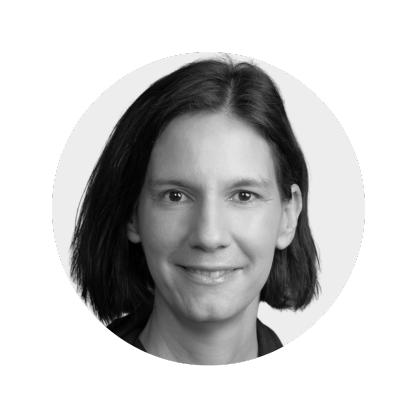
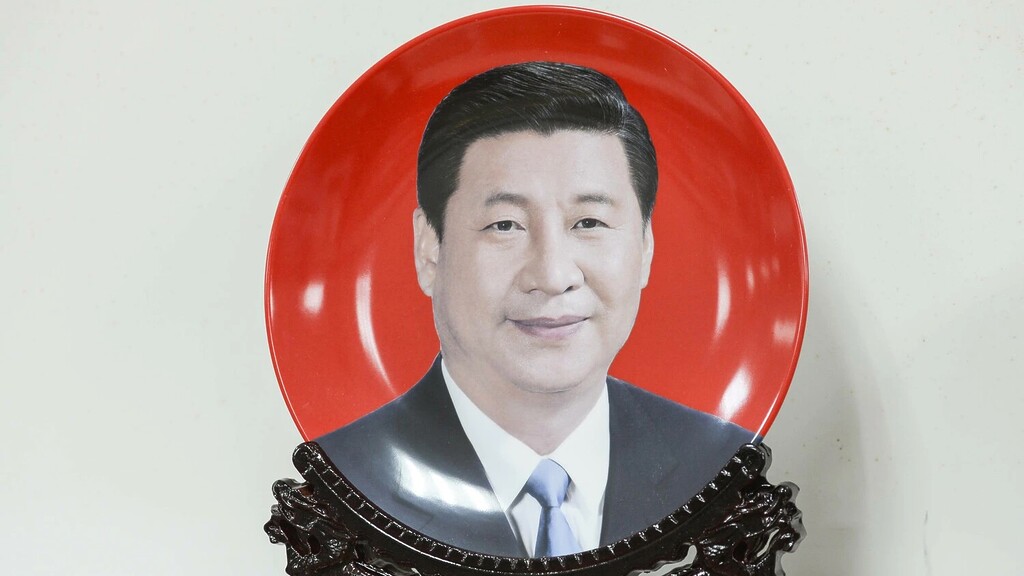
The uproar comes as a surprise to many in the West: Because US President Joe Biden and now also Germany’s Foreign Minister Annalena Baerbock called Chinese leader Xi Jinping a dictator, Beijing immediately summoned their respective ambassadors. Xi’s designation as a dictator was “absurd,” “irresponsible,” “infringed on China’s political dignity,” and, moreover, “an open political provocation.” The Oxford English Dictionary defines the term “dictator” as “a political leader who has complete power over a country.” So what is Xi if not a dictator? And why is he, of all people, suddenly reacting so thin-skinned to this? After all, Article 1 of the Chinese constitution already states that the party is committed to “upholding the democratic dictatorship of the people.”
“The term dictator is somewhat different in Chinese than in German,” explains Daniel Leese, a sinology professor at the University of Freiburg. His areas of expertise include the history and politics of Modern China. In Chinese, there are the terms “renmin minzhu zhuanzheng” (人民民主专政) for the democratic dictatorship of the people and “ducai zhe” (独裁者) for the dictator who exalts himself above all others. “So the terms have different levels. Ducai zhe has had a negative connotation in the sense of a tyrant or a despot since at least the 19th century. No one would generally use that as a self-designation, whereas dictatorship of the proletariat has positive connotations from the CCP’s point of view.”
In fact, earlier Chinese leaders refused to be called dictators by Western observers. “You mean I’m a dictatorship?” Jiang Zemin replied in broken English to journalist Mike Wallace during the famous “60 Minutes” interview in 2000. From his point of view, the designation was “as absurd as what the Arabian Nights may sound like,” the then 74-year-old laughed. He said he was merely a member of the Politburo, and nothing was decided without the consent of the other members, which made it impossible for him to be a dictator.
“The question of the dynamic between leader and people and party and people was interpreted differently at different stages of the Communist Party,” Leese says. Mao enshrined the idea of the dictatorship of the people as a theoretical cornerstone in the political system of the People’s Republic. In the Marxist-Leninist-Stalinist-Maoist view, a dictatorship is democratic because it empowers communists to do whatever they deem necessary to serve the “people” – or rather, the people who matter: the working class. In doing so, however, the Great Helmsman simultaneously and even half-ironically identified himself with Qin Shi Huang, the first emperor who for centuries was regarded in China as a prime example of a violent despot. “After Mao’s death, the prevailing consensus was that no person should be allowed to rise above others in the party, meaning that no one-person rule should exist in the party,” says Leese, explaining the horror Mao left in the minds of Chinese politicians like Deng Xiaoping.
Which brings us back to Xi Jinping. He has progressively eroded the embeddedness in a ruling collective Jiang Zemin referred to. He has abolished term limits in his favor. Within the party apparatus, he has eliminated rivals. His “Xi Jinping Thought” has become a mandatory ideological program, and Xi is also cultivating a cult of personality in other ways that his predecessors would never have dared to do. “There is less and less involvement of the Chinese people, but also within the party, as the cases surrounding the disappeared Chinese foreign minister and defense minister show,” says Angela Stanzel, a researcher at the German Institute for International and Security Affairs (SWP). “These are all signs of a dictatorship. That’s why the designation is justified.”
The outrage over being called a dictator also has to do with Xi’s desire to control which narratives about him dominate the international stage – and to do so more assertively than ever before. The fact that China does not want to be lectured from the outside about its own circumstances is a common thread running through his entire term in office. Xi Jinping wants to retain control over the intellectual interpretation and, at the same time, reevaluate concepts such as democracy.
Was the German foreign minister aware of all of this when she declared on Fox News that Xi is a dictator just like Putin? What is certain is that she deliberately intended to send a signal in various directions. “Of course, one can criticize the German foreign minister for saying something like that in a public setting and offending Chinese sentiments,” says Angela Stanzel. “But I believe that Baerbock was primarily sending a signal to the United States and its allies, and not necessarily to China, namely that we share the assessment of Xi as the leader of an authoritarian state.”
“The elephant in the room is that almost no autocrat calls himself a dictator,” Leese explains. In critical Chinese circles, however, Xi Jinping has certainly been referred to as a ducai zhe, or dictator in our sense of the word, at least since he lifted term limits. “I think that’s also where some of the current thin-skinnedness comes from.”
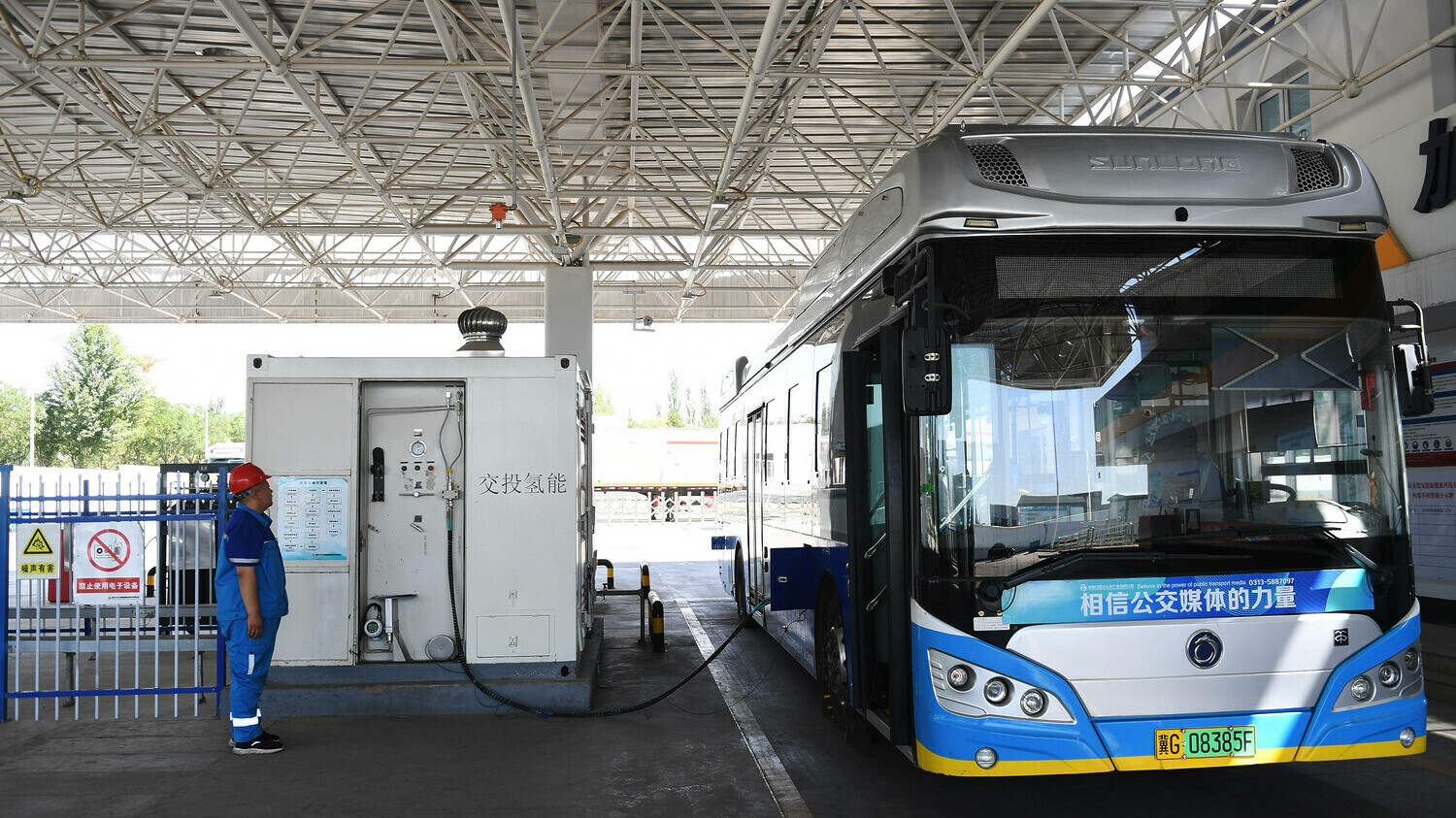
Wan Gang’s word carries weight in the car industry. In the 1990s, he worked at Audi in research and development. In China, he first founded the Institute for Hydrogen Technology at Tongji University and later became president of the university. The high point of his career to date was his work as Minister of Science and Technology from 2007 to 2018, where he was instrumental in the rapid expansion of electromobility. Trade magazines also call him the “father of the electric car.”
During a press conference on the sidelines of the International Motor Show (IAA), Wan Gang predicted that hydrogen technology would gain considerable importance in China, not only in the maritime, rail and commercial vehicle sectors, but also in individual transportation. Since China, with its market power, is also setting the pace for the global car market, another revolution could be on the horizon – despite all its disadvantages.
China’s focus on hydrogen is unsurprising. The People’s Republic is already the world’s largest producer. The problem is that the country produces only 1.5 percent of it from renewables, according to calculations by the Center for Strategic & International Studies (CSIS). By 2030, this figure is expected to reach ten percent.
The “Hydrogen Industry Development Plan (2021-2035)” provides the framework. It is striking that the largest green hydrogen production projects are located in the north of the country (see figure). There is ample space for solar and wind plants there. At the press conference, Wan Gang emphasized that hydrogen mobility would play an important role in the country’s northwest. Here, distances between cities are long and electric cars are hardly widespread. Since the Communist Party is serious about its carbon plans (peak in 2030; climate neutrality in 2060), it must also find a climate-neutral solution for this region.
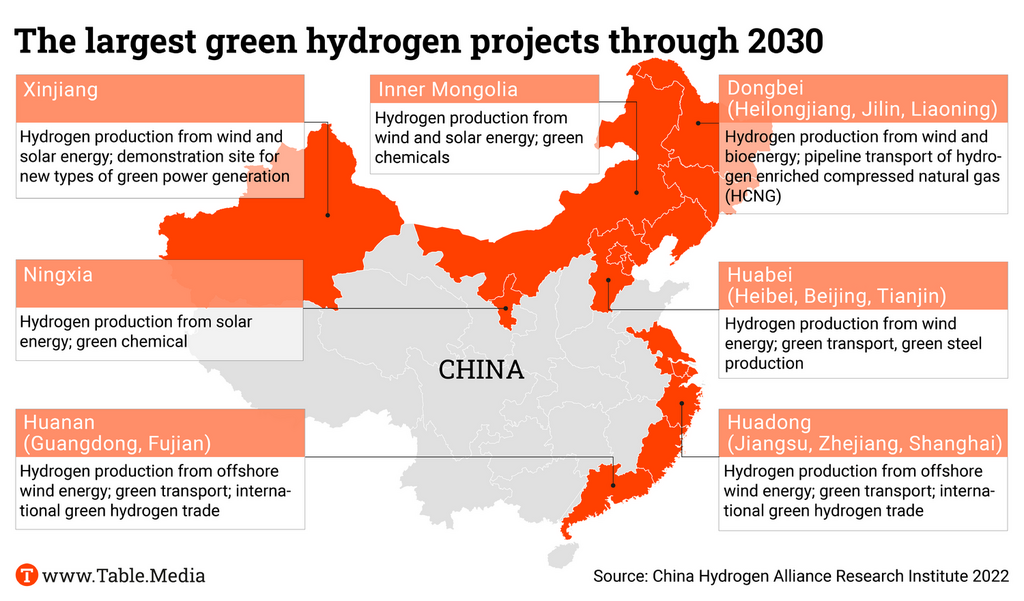
However, this is also the highest hurdle China’s hydrogen plans have to overcome. The production of hydrogen requires a tremendous amount of energy. In addition, its efficiency in passenger cars is low compared to conventional EVs. On top of that, China, the fourth-largest country in the world in terms of size, would need a third charging or refueling infrastructure after gasoline and electricity. However, Wan Gang’s economic and subsidy policies for EVs have shown how such problems can be solved.
Wan Gang’s statement is also a pointer for the car industry. The leading manufacturer in this field is Toyota. On the one hand, the world’s largest automaker traditionally focuses on promising niche technologies. With its hybrid drive (Prius), it has already proven it has the right instinct and the necessary perseverance. On the other hand, Japan also pursues a holistic hydrogen strategy, which envisages the heating of private homes in addition to mobility and energy storage.
Toyota has long since positioned itself strategically in China with its hydrogen products. For instance, the Japanese are researching and developing hydrogen cars jointly with the Chinese brands FAW and GAC. Toyota also announced plans for a so-called hydrogen factory – an R&D center that will bundle competencies in this area. In addition to Japan, local centers will be set up in Europe, North America and China.
The company plans to bring around 200,000 hydrogen vehicles onto the roads by 2030. By comparison, Toyota built 3,900 in 2020. The key technology behind this is the fuel cell. It converts hydrogen into electricity, which is then used to power the electric motor. Higher volumes could reduce the price of the component by up to 37 percent, promises Toyota’s head of technology, Hiroki Nakajima.
BMW is one of the buyers of the fuel cell. The German brand started hydrogen research early but significantly cut back spending for several years. Now, they want to step on the gas all the more. On the sidelines of the IAA, BMW CEO Oliver Zipse, already called for more dedication to the expansion of hydrogen. He sees synergies between commercial vehicles and passenger cars.
BMW will also produce the “New Class” from 2025. These cars will be comparable to the BMW 3 Series in terms of size and price. The platform is currently being adapted to Chinese needs and will allow the production of hydrogen variants. “For us, hydrogen is always part of the equation when we talk about zero-emission vehicles. That is what sets our approach apart from the rest,” Zipse said.
However, BMW is not conducting hydrogen research in China itself, a press spokesperson told Table.Media. “We are in intensive exchange with our local colleagues from development in China. However, the core competence in the development of a potential series product currently lies in our research and innovation center in Munich.” At least a test fleet of the iX5 Hydrogen is on the road in the People’s Republic. After all, “we are experiencing a massive hydrogen trend in China.” A view BMW shares with Wan Gang.
Sept. 25, 2023; 10 p.m. CEST (Sept. 26; 4 a.m. CST)
Fairbanks Center for Chinese Studies, Seminar: China Humanities Seminar featuring Charles Hartman – Structures of Governance in Song Dynasty China More
Sept. 25, 2023; 10 a.m. CEST (4 p.m. CST)
Dezan Shira & Associates, Webinar: Exploring Indonesia’s Top Investment Sectors: Midyear Recap and FDI Exploration Guide More
Sept. 25, 2023; 10:30 p.m. CEST (4:30 a.m. CST)
Fairbanks Center for Chinese Studies, webcast: Daniel A. Bell – China’s Struggle between Communism and Confucianism More
Sept. 26, 2023; 10 a.m. CEST (4 p.m. CST)
Dezan Shira & Associates, Webinar: Hong Kong HR and Payroll Compliance: Managing Complexities for FDI Companies and Beyond More
Sept. 27, 2023; 10 a.m., Berlin
MERICS Roundtable: AI Entanglements – Assessing the Tradeoffs of European-Chinese Collaboration More
Sept. 27, 2023; 10:30 p.m. CEST (Sept. 28; 4:30 a.m. CST)
Harvard-Yenching Institute: Lung Yingtai – My Life in an Indigenous Village More
Sept. 27, 2023; 10 a.m. CEST (Sept. 28; 4:30 p.m. CST)
Dezan Shira & Associates, Webinar: Transfer Pricing Issues for Foreign Companies in Vietnam – A Practical Overview More
Sept. 28; 2:50 p.m. CST
German Chamber of Commerce China, GCC Knowledge Hub: Overview of the current fundamentals of rare earths More
The Chinese Embassy in Berlin has warned about a potential ban on Huawei and ZTE in German telecommunications networks. “If the German government really decides to move in this direction without proving that Chinese products pose a security threat to Germany, we will not stand by idly,” the embassy said in an emailed statement to Reuters. “Should Germany unjustifiably exclude Chinese companies, this would not only be a violation of the principle of fair competition, but would also harm Chinese companies and Germany itself,” the Chinese embassy said.
Chinese representatives stressed that Huawei and ZTE have long been operating in Germany in accordance with German law. The background to this is a proposal from the German Interior Ministry to force telecommunications operators to restrict the use of equipment from Chinese manufacturers Huawei and ZTE. Most recently, details of the possible ban had leaked from the ministry. The debate was preceded by a review by the Interior Ministry, which highlighted Germany’s dependence on the two Chinese suppliers. The Interior Ministry plans to present its approach to the cabinet starting next week. rtr
In light of various domestic economic problems, there are questions about whether Beijing can continue to fund its multi-billion dollar Belt & Road Initiative (BRI). Christoph Nedopil, Director of the Griffith Asia Institute and Professor at Griffith University in Brisbane, Australia, sees China’s current economic development as a driver rather than a barrier to foreign investment. The trend of BRI projects is shifting from purely government funding to private funding by companies anyway – and they continue to have a high interest in foreign countries, Nedopil argued Thursday at the Kiel Institute for the World Economy’s (IfW) Global China Conversations event series on “Global Gateway and the Belt and Road: A Sustainable Alternative?”
Nedopil said he does not believe the domestic situation will contribute to a lull in BRI. Reinhard Buetikofer, a Green Party MEP and chair of the EU Parliament’s China delegation, pointed out that China is not home to private companies according to Western definitions. Even market giants like Alibaba are subject to the “logic of the state,” the EU politician said.
During the online debate, the German EU politician did not deny that Brussels “Global Gate” is a bit of a copy of the BRI: “We are copying in a way, indeed.” But with the EU initiative, “undeniably new points are now being set,” Buetikofer emphasized. Partner countries wanted to be more appreciated. The new trade corridor between India and the EU signed on the sidelines of the G20 summit in New Delhi was receiving a lot of “political goodwill.” However, the ambitious plan is not yet backed by investments, but there is a lot of support from the EU member states, he said.
BRI expert Nedopil sees Brussels’ copying approach as a tactical mistake: It is difficult to compete with China in fields where the People’s Republic already has a head start. “Why don’t we create alternatives that build on our own strengths? Why are we copying in areas where China is better?” Europe needs to be clear about where its strengths lie, Nedopil argued.
China.Table is media partner of the Global China Conversations event series of the Kiel Institute for the World Economy (IfW Kiel).
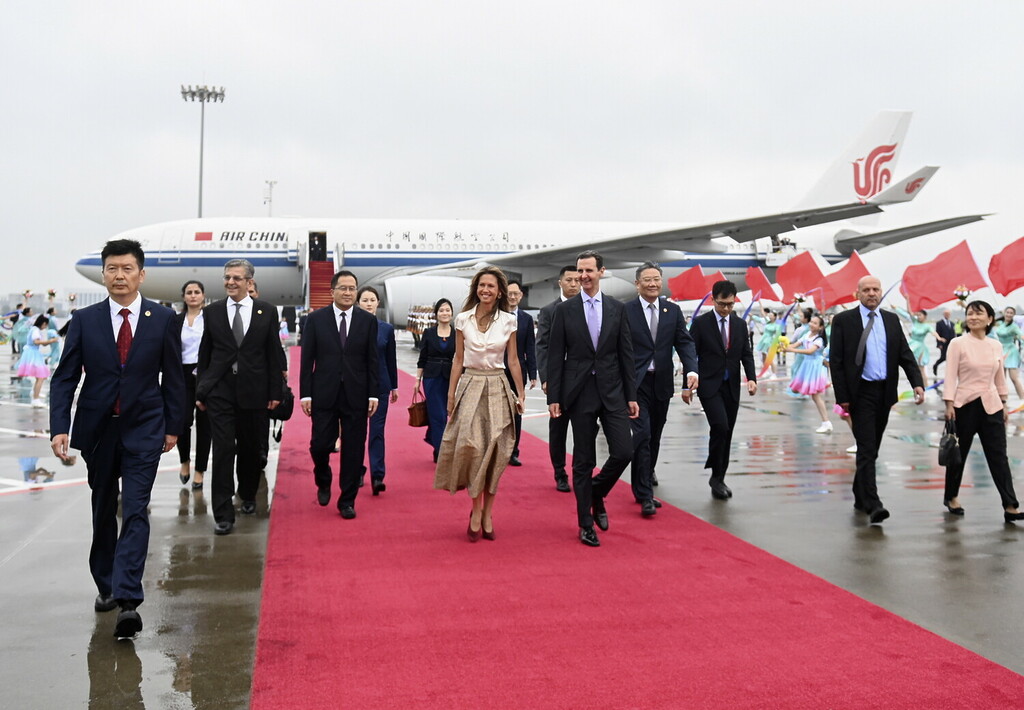
Syrian President Bashar al-Assad has arrived in the eastern Chinese city of Hangzhou for his first visit to China since 2004. The trip is considered another attempt to end over a decade of diplomatic isolation due to Western sanctions. The Syrian leader has rarely made foreign trips since 2011. At that time, the civil war began, killing more than half a million people.
Syria joined China’s Belt & Road Initiative in 2022 and was readmitted to the Arab League in May. On Saturday, Assad will attend the opening ceremony of the Asian Games along with more than a dozen other foreign dignitaries. He will then continue to meetings in several Chinese cities, including with President Xi Jinping on Friday.
Syria’s economy is struggling, and Assad’s efforts to restore relations with Arab states are only slowly bearing fruit. As a result, Assad is interested in financial support. But any Chinese or other investment in Syria entails the risk of US sanctions.
Efforts to impose multilateral sanctions have failed to gain the support of the UN Security Council, where China and Russia have a veto. China has vetoed UN motions condemning the Assad government at least eight times. However, China has not directly supported the regime’s efforts to regain control of the country. rtr/cyb
China’s top climate envoy, Xie Zhenhua, said export controls on renewable energy products are “politicizing” and “dangerous” to climate goals. At a forum hosted by the Chinese think tank Centre for China and Globalisation in Beijing, he said protectionism could jeopardize the G20’s clean energy goals.
Meanwhile, EU and US diplomats urged the Chinese government to do more to reduce greenhouse gas emissions. They urged China to reduce its use of coal, commit to cutting methane emissions, and crack down on illegal deforestation. This was reported by the South China Morning Post.
Xie shared the stage at the panel discussion with US Ambassador Nicholas Burns and his EU counterpart Jorge Toledo Albiñana. China, the United States, and the EU are the world’s top three greenhouse gas emitters. At annual United Nations climate conferences, better known as COP meetings, they have repeatedly called on each other to step up efforts. cyb
Chinese EV maker Nio has also commented on the EU Commission’s announced subsidy investigations into Chinese EV exports. China’s ninth-largest EV manufacturer has already taken the plunge into Germany and Europe. On the sidelines of the launch of its first own smartphone, Nio CEO William Li said he hoped governments would show openness instead of isolationism. He said lessons to be learnt from China’s new energy vehicle (NEV) development were to be open and welcome competition to benefit users and global sustainable development.
Nio’s President Qin Lihong also commented at the event, “Let the market be the market. As an entrepreneur, I hope that governments and the private sector can guide the NEV sector positively.” According to the European Commission, China’s share of EV sales in Europe is now eight percent, and could reach 15 percent by 2025.
According to Nio President Li, Nio will probably reach its break-even point faster than Tesla. The company recently posted higher losses than last year, with a second-quarter loss of 6.12 billion yuan (790 million euros), more than double last year’s figure. However, Li expects gross margins of 20 percent in the long term. rtr/jul

“It’s the economy, stupid!”. Bill Clinton won the trust of the US public and the presidential election in 1992 with this slogan. At the same time, Deng Xiaoping shouted, “It’s the economic development that counts,” and restarted China’s reform engine during his legendary trip to southern China. Deng also forced the party leadership of the time onto the path of a market economy and freed the nation from the ideological rigidity that had been forced upon it after the Tiananmen massacre in 1989. It was Deng himself who had ordered the military intervention on June 4. But he was also the one who, thanks to his market reforms, brought the People’s Republic out of its ostracism and sanctions.
To kick off the economic reboot, Deng first went to the industrial and port metropolis of Shanghai before his trip to southern China and wrote to his dogmatic comrades: “Do not believe that a planned economy is socialist and a market economy is capitalist” (Deng Xiaoping Selected Works, Vol. 3, p. 353). Publicly, he did not repent for the massacre he had ordered in 1989, but for his failed economic policy. He had failed to recognize and play Shanghai as “our trump card” (上海是我们的王牌) in time. “One of my big mistakes was not including Shanghai when we set up the four special economic zones” (我的一个大失误就是搞四个经济特区时没有加上上海). That he regretted this until his death can also be gleaned from the biography of Deng’s final 22 years of life. (邓小平年谱 1975-1997).
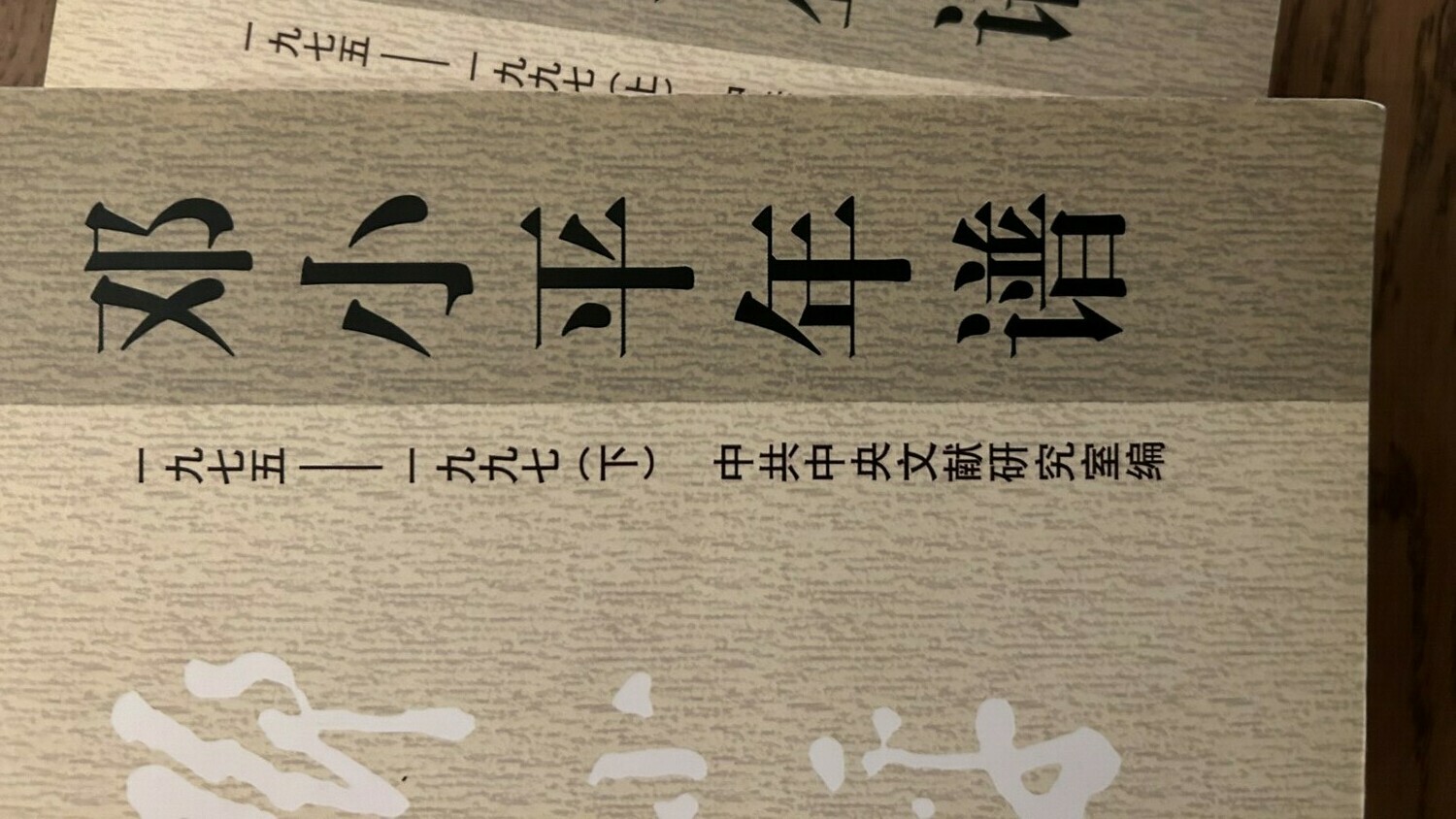
The modern autocrat proved to be a master of pragmatism as long as his own rule was not endangered. He banned any debate about whether his reforms were “capitalist or socialist,” stamped Shanghai’s Pudong out of the ground as a superfinance zone, and had the first stock exchange founded.
China’s ideologues, from Mao Zedong to Xi Jinping today, have always distrusted Shanghai’s dynamism, feared the loss of control over the metropolis, and kept a short leash on Shanghai via their centralized Beijing power apparatus. Things were only different in times of crisis, such as in 2009, when China had to brace itself against the global financial crisis. Beijing granted Shanghai special rights to develop into a “global financial and shipping center” by 2020 and to become China’s “dragon head” for the Yangtze River Delta.
A booming Shanghai attracted domestic and foreign investors. “Once again, Shanghai has had a set of favorable policies bestowed upon it by those in power,” internationally renowned China expert Cheng Li wrote approvingly in a study for Brookings.
Today, autocrat Xi Jinping faces the same question as Deng once did: By what means and in what ways can China pull itself out of the self-inflicted pit of economic stagnation? Longtime observers believe that, unlike Deng, he has neither the strength nor the will to jump over his shadow.
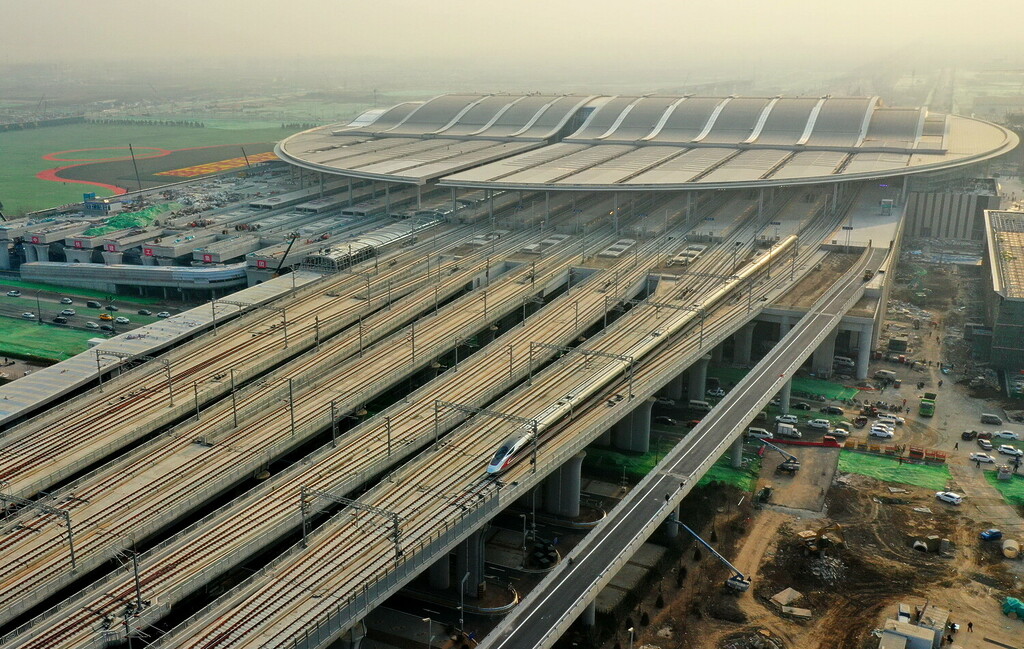
Among Xi’s ex-admirers and today’s disappointed is former chief economist for Morgan Stanley and Yale University, economist Stephen Roach. Before the 20th Party Congress in 2022, he wrote, “In Xi’s China, dogma trumps everything.” When Xi took office, he had hoped “that his so-called “Third Plenum Reforms” of 2013 would usher in a new era of strong economic performance … My biggest mistake was to minimize the consequences of Xi Jinping Thought.”
China experts are now paying close attention to Beijing’s preparations for the next Third Plenum of the Central Committee. It always convenes in the first year after a new party congress, usually at the end of October or November. Traditionally, this is where the party sets its future programmatic course. Third plenums have repeatedly set the course for economic reform since 1978.
Whether this will also be the case this time is doubtful. Apart from paying lip service to promoting the private sector, Xi has not only set other ideological priorities – he has also created his own development model. The party leader demonstratively visited his pet project, Xiong’an, in May on the sixth anniversary of the start of its construction; a new “super city of the future” that has been bursting from the ground since 2017. Located 100 kilometers southwest of Beijing, it is supposed to relieve the capital as a secondary metropolis and become a showcase for all of China as a high-tech and ecological hub.
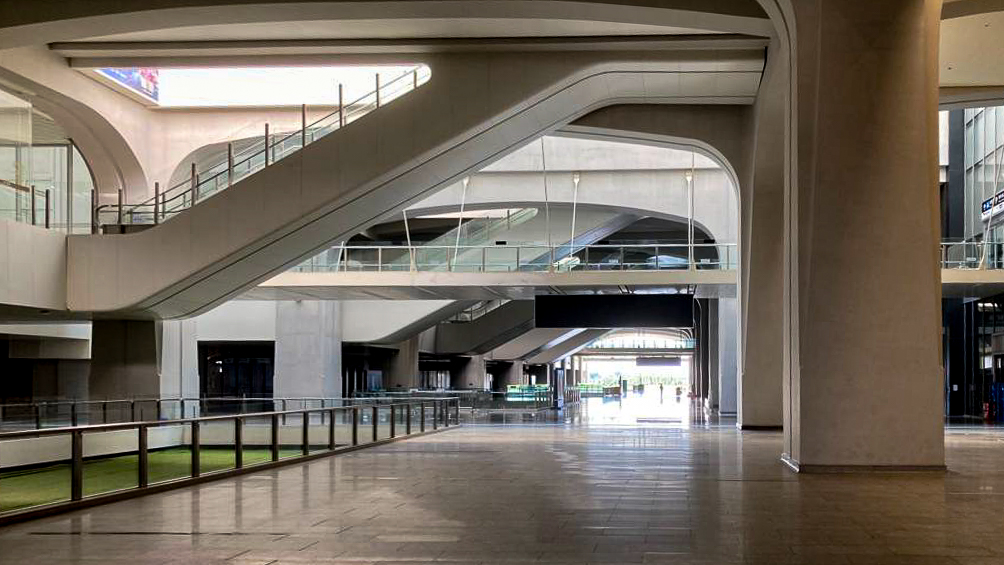
Xi was “personally leading planning and decision-making” and wanted to “develop Xiong’an to a level comparable to Shenzhen’s special economic zone and Shanghai’s Pudong,” the party press wrote. Xi called his “future city” a “national project with thousand-year significance.” The party leader also visited the gigantic train station for high-speed trains from Beijing. After 30 months of construction, it was finished in 2020. Travelers have so far found it deserted.
Recently, China’s state media have been spreading striking success stories about Shanghai’s special economic zone, contrasting with dire news about the reality of China’s desolate economic situation. Many articles sound as if they are urging Xi to introduce more new reforms before the Third Plenum, and to start them in Shanghai. The argument is that everything that happens there bears fruit for the whole of China.
Among the praise, a long elaboration printed in the September issue of Qiushi, the party magazine published by the Central Committee, stands out: “Pujiang (synonym for Pudong) waves are crashing high – the east wind is blowing” (浦江潮涌,东方风来), the “Shanghai Research Center for Xi Jinping Thought” headlines the essay. The authors invoke Xi’s new formula that the “world is undergoing profound changes unseen in a century” (直面世界百年未有之大变局), and his resulting call for Shanghai to play a unique role as the central mediating axis for China’s new development theory of the two domestic and foreign economic cycles.
As a pioneer of reform and opening-up, Shanghai has become not only an economic, financial, commercial and shipping hub, but also a city where rockets, satellites, large ships and commercial aircraft are developed. A long list describes Shanghai’s development into a hub for high-tech and innovation, for trade and financial markets and their internationalization, for strategic raw materials, for future industries up to artificial intelligence, and world-class industrial clusters.
But Xi is facing growing pressure ahead of the Third Plenum to deliver more than just wishy-washy words and promises, such as promoting private industry to revive the economy. Even the Hong Kong-based South China Morning Post (SCMP) now urged China’s leadership to boldly depart from its previous policies. In a remarkable commentary, its former editor-in-chief Wang Xiangwei wrote that Beijing has numerous tools at its disposal to revive the economy. But for them to be effective, “nothing short of a mind-set change” is needed.
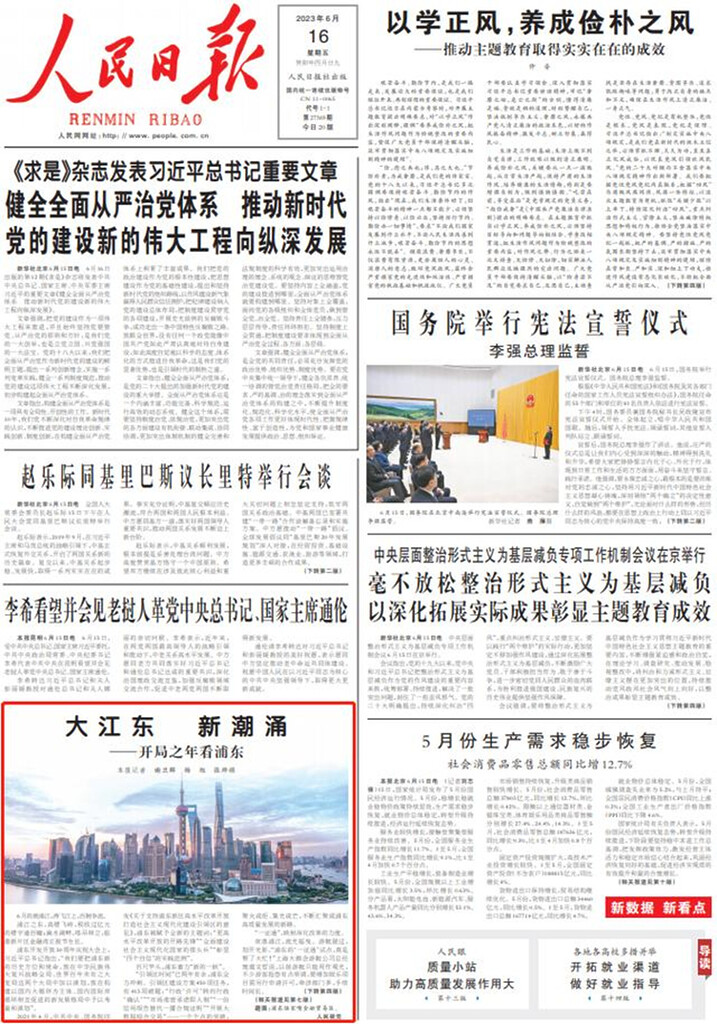
The “charm offensive” that government officials have been using since July to woo China’s private industry, or the establishment of a high-level office to help them, are useless. Private businesses “don’t need an official babysitter,” but guaranteed, level playing fields and legal protection. One of the main reasons the private sector has boomed so much over the past four decades, he says, is that the government has largely left it alone. As a confidence-building measure, Wang suggests the Beijing leadership “to release those business owners who have been detained on suspicions of corruption for a prolonged period of time without any explanation.” The authorities could revive the real estate market by doubling “the leasehold terms for residential properties from 70 years to 140 years or longer.”
“We shouldn’t call ‘peak China’ just yet,” wrote Martin Wolf, a well-known business columnist, in the Financial Times this week. However, Beijing must prove that it has a leadership capable of change and that it is willing to “take the steps needed not just to increase demand now, but to tackle the structural problems of over-saving and over-investment, over-reliance on the property market, excessive leverage, and so forth.” China underwent a far greater transformation in the late 1970s, he added. “Of course, the leadership also changed. Will it this time, too?”
But today is a different time. The reformer Deng Xiaoping confessed to making two major mistakes after 1989, including “neglecting” the ideological and political education of China’s youth for “ten years.” Deng turned out to be a communist hardliner who demanded socialist discipline. On issues of economic reform, however, he was capable of doing things differently.
Xi has yet to admit any mistakes. Last week, he published an essay in which he demanded that China’s education be developed into the world’s strongest by 2035. The CC magazine Qiushi revealed what kind of youth he wants to raise. Xi says, “Our education must not raise socialist saboteurs and gravediggers of socialism, and certainly not people who look Chinese but have no Chinese heart, no Chinese feelings, and no Chinese style of taste! That would be a failure of education” (我们的教育绝不能培养社会主义破坏者和掘墓人,绝不能培养出一些’长着中国脸,不是中国心,没有中国情,缺少中国味’的人!那将是教育的失败).
This is more dogmatic thinking than Deng ever did. Xi wants absolute control over everything. There is reason to fear that he will hardly play Shanghai as a trump card for real market reforms at the upcoming plenum.
Yang Jing has been appointed by Hong Kong-based investment holding company Tysan Holdings as an independent non-executive director and a member of the audit committee, nomination committee and remuneration committee of the Board.
Kenny Ng joined RBC Wealth Management in September as Managing Director and Team Leader in Hong Kong. He previously worked for Credit Suisse and DBS Bank. Ng will report to Ignatius K.K. (Iggy) Chong, Head of Enterprise Private Clients, Asia and Interim Market Head, Greater China.
Is something changing in your organization? Let us know at heads@table.media!
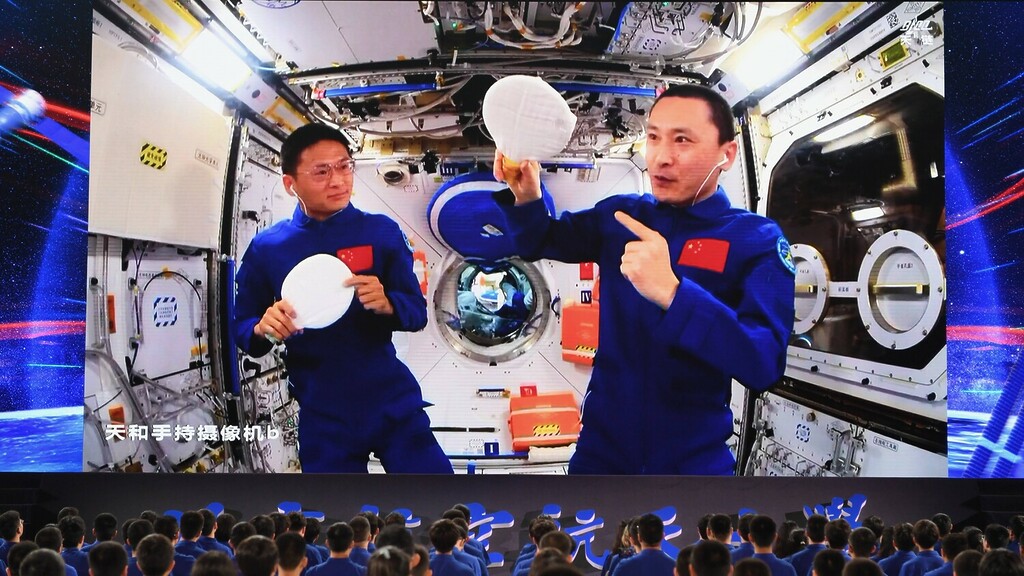
Live from Space: For the fourth time, Beihang University in Beijing held classes via direct broadcast from the Chinese space station on Thursday. The Shenzhou 16 taikonauts Jing Haipeng, Zhu Yangzhu and Gui Haichao (Gui and Zhu are shown in the photo) spoke to the students on Earth.
Of course, it was not an accident. Hardly anyone would have believed that German Foreign Minister Annalena Baerbock accidentally called China’s President Xi Jinping a “dictator” on the US channel Fox. She dispelled any last doubts on Wednesday evening: “I said what I said. It is a communist one-party system,” the minister said on German TV.
Beijing reacted outraged before and rejected the statements as “absurd,” “irresponsible,” and “a serious infringement of China’s political dignity.” The waves also ran so high because the term has a different meaning in Chinese than in German, explains Fabian Peltsch. In Chinese, there are the terms “renmin minzhu zhuanzheng” for the democratic dictatorship of the people and “ducai zhe” for the dictator who exalts himself above all others – a significant difference. However: Since the lifting of his term limits, at the latest, critical circles in the People’s Republic have also referred to Xi as a dictator in the latter sense, and thus in our sense. Perhaps this is another reason for such a strong reaction.
China plans its hydrogen future with a much cooler head. With the triumph of electric cars, the technology was actually considered obsolete in passenger cars. However, mobility requirements and energy planning are pushing the technology back into the conversation in China – and on a global scale, writes Christian Domke Seidel. China’s market power could be the impetus for another technical revolution.
In order to pull China out of the pit of economic stagnation, Xi would have to change his way of thinking and admit his own mistakes. The only Chinese leader to ever do so publicly was Deng Xiaoping. Johnny Erling analyzes in his column which of these mistakes he admitted and which mistakes Xi denies – especially why this could be highly problematic in the run-up to the Third Plenum this October.


The uproar comes as a surprise to many in the West: Because US President Joe Biden and now also Germany’s Foreign Minister Annalena Baerbock called Chinese leader Xi Jinping a dictator, Beijing immediately summoned their respective ambassadors. Xi’s designation as a dictator was “absurd,” “irresponsible,” “infringed on China’s political dignity,” and, moreover, “an open political provocation.” The Oxford English Dictionary defines the term “dictator” as “a political leader who has complete power over a country.” So what is Xi if not a dictator? And why is he, of all people, suddenly reacting so thin-skinned to this? After all, Article 1 of the Chinese constitution already states that the party is committed to “upholding the democratic dictatorship of the people.”
“The term dictator is somewhat different in Chinese than in German,” explains Daniel Leese, a sinology professor at the University of Freiburg. His areas of expertise include the history and politics of Modern China. In Chinese, there are the terms “renmin minzhu zhuanzheng” (人民民主专政) for the democratic dictatorship of the people and “ducai zhe” (独裁者) for the dictator who exalts himself above all others. “So the terms have different levels. Ducai zhe has had a negative connotation in the sense of a tyrant or a despot since at least the 19th century. No one would generally use that as a self-designation, whereas dictatorship of the proletariat has positive connotations from the CCP’s point of view.”
In fact, earlier Chinese leaders refused to be called dictators by Western observers. “You mean I’m a dictatorship?” Jiang Zemin replied in broken English to journalist Mike Wallace during the famous “60 Minutes” interview in 2000. From his point of view, the designation was “as absurd as what the Arabian Nights may sound like,” the then 74-year-old laughed. He said he was merely a member of the Politburo, and nothing was decided without the consent of the other members, which made it impossible for him to be a dictator.
“The question of the dynamic between leader and people and party and people was interpreted differently at different stages of the Communist Party,” Leese says. Mao enshrined the idea of the dictatorship of the people as a theoretical cornerstone in the political system of the People’s Republic. In the Marxist-Leninist-Stalinist-Maoist view, a dictatorship is democratic because it empowers communists to do whatever they deem necessary to serve the “people” – or rather, the people who matter: the working class. In doing so, however, the Great Helmsman simultaneously and even half-ironically identified himself with Qin Shi Huang, the first emperor who for centuries was regarded in China as a prime example of a violent despot. “After Mao’s death, the prevailing consensus was that no person should be allowed to rise above others in the party, meaning that no one-person rule should exist in the party,” says Leese, explaining the horror Mao left in the minds of Chinese politicians like Deng Xiaoping.
Which brings us back to Xi Jinping. He has progressively eroded the embeddedness in a ruling collective Jiang Zemin referred to. He has abolished term limits in his favor. Within the party apparatus, he has eliminated rivals. His “Xi Jinping Thought” has become a mandatory ideological program, and Xi is also cultivating a cult of personality in other ways that his predecessors would never have dared to do. “There is less and less involvement of the Chinese people, but also within the party, as the cases surrounding the disappeared Chinese foreign minister and defense minister show,” says Angela Stanzel, a researcher at the German Institute for International and Security Affairs (SWP). “These are all signs of a dictatorship. That’s why the designation is justified.”
The outrage over being called a dictator also has to do with Xi’s desire to control which narratives about him dominate the international stage – and to do so more assertively than ever before. The fact that China does not want to be lectured from the outside about its own circumstances is a common thread running through his entire term in office. Xi Jinping wants to retain control over the intellectual interpretation and, at the same time, reevaluate concepts such as democracy.
Was the German foreign minister aware of all of this when she declared on Fox News that Xi is a dictator just like Putin? What is certain is that she deliberately intended to send a signal in various directions. “Of course, one can criticize the German foreign minister for saying something like that in a public setting and offending Chinese sentiments,” says Angela Stanzel. “But I believe that Baerbock was primarily sending a signal to the United States and its allies, and not necessarily to China, namely that we share the assessment of Xi as the leader of an authoritarian state.”
“The elephant in the room is that almost no autocrat calls himself a dictator,” Leese explains. In critical Chinese circles, however, Xi Jinping has certainly been referred to as a ducai zhe, or dictator in our sense of the word, at least since he lifted term limits. “I think that’s also where some of the current thin-skinnedness comes from.”

Wan Gang’s word carries weight in the car industry. In the 1990s, he worked at Audi in research and development. In China, he first founded the Institute for Hydrogen Technology at Tongji University and later became president of the university. The high point of his career to date was his work as Minister of Science and Technology from 2007 to 2018, where he was instrumental in the rapid expansion of electromobility. Trade magazines also call him the “father of the electric car.”
During a press conference on the sidelines of the International Motor Show (IAA), Wan Gang predicted that hydrogen technology would gain considerable importance in China, not only in the maritime, rail and commercial vehicle sectors, but also in individual transportation. Since China, with its market power, is also setting the pace for the global car market, another revolution could be on the horizon – despite all its disadvantages.
China’s focus on hydrogen is unsurprising. The People’s Republic is already the world’s largest producer. The problem is that the country produces only 1.5 percent of it from renewables, according to calculations by the Center for Strategic & International Studies (CSIS). By 2030, this figure is expected to reach ten percent.
The “Hydrogen Industry Development Plan (2021-2035)” provides the framework. It is striking that the largest green hydrogen production projects are located in the north of the country (see figure). There is ample space for solar and wind plants there. At the press conference, Wan Gang emphasized that hydrogen mobility would play an important role in the country’s northwest. Here, distances between cities are long and electric cars are hardly widespread. Since the Communist Party is serious about its carbon plans (peak in 2030; climate neutrality in 2060), it must also find a climate-neutral solution for this region.

However, this is also the highest hurdle China’s hydrogen plans have to overcome. The production of hydrogen requires a tremendous amount of energy. In addition, its efficiency in passenger cars is low compared to conventional EVs. On top of that, China, the fourth-largest country in the world in terms of size, would need a third charging or refueling infrastructure after gasoline and electricity. However, Wan Gang’s economic and subsidy policies for EVs have shown how such problems can be solved.
Wan Gang’s statement is also a pointer for the car industry. The leading manufacturer in this field is Toyota. On the one hand, the world’s largest automaker traditionally focuses on promising niche technologies. With its hybrid drive (Prius), it has already proven it has the right instinct and the necessary perseverance. On the other hand, Japan also pursues a holistic hydrogen strategy, which envisages the heating of private homes in addition to mobility and energy storage.
Toyota has long since positioned itself strategically in China with its hydrogen products. For instance, the Japanese are researching and developing hydrogen cars jointly with the Chinese brands FAW and GAC. Toyota also announced plans for a so-called hydrogen factory – an R&D center that will bundle competencies in this area. In addition to Japan, local centers will be set up in Europe, North America and China.
The company plans to bring around 200,000 hydrogen vehicles onto the roads by 2030. By comparison, Toyota built 3,900 in 2020. The key technology behind this is the fuel cell. It converts hydrogen into electricity, which is then used to power the electric motor. Higher volumes could reduce the price of the component by up to 37 percent, promises Toyota’s head of technology, Hiroki Nakajima.
BMW is one of the buyers of the fuel cell. The German brand started hydrogen research early but significantly cut back spending for several years. Now, they want to step on the gas all the more. On the sidelines of the IAA, BMW CEO Oliver Zipse, already called for more dedication to the expansion of hydrogen. He sees synergies between commercial vehicles and passenger cars.
BMW will also produce the “New Class” from 2025. These cars will be comparable to the BMW 3 Series in terms of size and price. The platform is currently being adapted to Chinese needs and will allow the production of hydrogen variants. “For us, hydrogen is always part of the equation when we talk about zero-emission vehicles. That is what sets our approach apart from the rest,” Zipse said.
However, BMW is not conducting hydrogen research in China itself, a press spokesperson told Table.Media. “We are in intensive exchange with our local colleagues from development in China. However, the core competence in the development of a potential series product currently lies in our research and innovation center in Munich.” At least a test fleet of the iX5 Hydrogen is on the road in the People’s Republic. After all, “we are experiencing a massive hydrogen trend in China.” A view BMW shares with Wan Gang.
Sept. 25, 2023; 10 p.m. CEST (Sept. 26; 4 a.m. CST)
Fairbanks Center for Chinese Studies, Seminar: China Humanities Seminar featuring Charles Hartman – Structures of Governance in Song Dynasty China More
Sept. 25, 2023; 10 a.m. CEST (4 p.m. CST)
Dezan Shira & Associates, Webinar: Exploring Indonesia’s Top Investment Sectors: Midyear Recap and FDI Exploration Guide More
Sept. 25, 2023; 10:30 p.m. CEST (4:30 a.m. CST)
Fairbanks Center for Chinese Studies, webcast: Daniel A. Bell – China’s Struggle between Communism and Confucianism More
Sept. 26, 2023; 10 a.m. CEST (4 p.m. CST)
Dezan Shira & Associates, Webinar: Hong Kong HR and Payroll Compliance: Managing Complexities for FDI Companies and Beyond More
Sept. 27, 2023; 10 a.m., Berlin
MERICS Roundtable: AI Entanglements – Assessing the Tradeoffs of European-Chinese Collaboration More
Sept. 27, 2023; 10:30 p.m. CEST (Sept. 28; 4:30 a.m. CST)
Harvard-Yenching Institute: Lung Yingtai – My Life in an Indigenous Village More
Sept. 27, 2023; 10 a.m. CEST (Sept. 28; 4:30 p.m. CST)
Dezan Shira & Associates, Webinar: Transfer Pricing Issues for Foreign Companies in Vietnam – A Practical Overview More
Sept. 28; 2:50 p.m. CST
German Chamber of Commerce China, GCC Knowledge Hub: Overview of the current fundamentals of rare earths More
The Chinese Embassy in Berlin has warned about a potential ban on Huawei and ZTE in German telecommunications networks. “If the German government really decides to move in this direction without proving that Chinese products pose a security threat to Germany, we will not stand by idly,” the embassy said in an emailed statement to Reuters. “Should Germany unjustifiably exclude Chinese companies, this would not only be a violation of the principle of fair competition, but would also harm Chinese companies and Germany itself,” the Chinese embassy said.
Chinese representatives stressed that Huawei and ZTE have long been operating in Germany in accordance with German law. The background to this is a proposal from the German Interior Ministry to force telecommunications operators to restrict the use of equipment from Chinese manufacturers Huawei and ZTE. Most recently, details of the possible ban had leaked from the ministry. The debate was preceded by a review by the Interior Ministry, which highlighted Germany’s dependence on the two Chinese suppliers. The Interior Ministry plans to present its approach to the cabinet starting next week. rtr
In light of various domestic economic problems, there are questions about whether Beijing can continue to fund its multi-billion dollar Belt & Road Initiative (BRI). Christoph Nedopil, Director of the Griffith Asia Institute and Professor at Griffith University in Brisbane, Australia, sees China’s current economic development as a driver rather than a barrier to foreign investment. The trend of BRI projects is shifting from purely government funding to private funding by companies anyway – and they continue to have a high interest in foreign countries, Nedopil argued Thursday at the Kiel Institute for the World Economy’s (IfW) Global China Conversations event series on “Global Gateway and the Belt and Road: A Sustainable Alternative?”
Nedopil said he does not believe the domestic situation will contribute to a lull in BRI. Reinhard Buetikofer, a Green Party MEP and chair of the EU Parliament’s China delegation, pointed out that China is not home to private companies according to Western definitions. Even market giants like Alibaba are subject to the “logic of the state,” the EU politician said.
During the online debate, the German EU politician did not deny that Brussels “Global Gate” is a bit of a copy of the BRI: “We are copying in a way, indeed.” But with the EU initiative, “undeniably new points are now being set,” Buetikofer emphasized. Partner countries wanted to be more appreciated. The new trade corridor between India and the EU signed on the sidelines of the G20 summit in New Delhi was receiving a lot of “political goodwill.” However, the ambitious plan is not yet backed by investments, but there is a lot of support from the EU member states, he said.
BRI expert Nedopil sees Brussels’ copying approach as a tactical mistake: It is difficult to compete with China in fields where the People’s Republic already has a head start. “Why don’t we create alternatives that build on our own strengths? Why are we copying in areas where China is better?” Europe needs to be clear about where its strengths lie, Nedopil argued.
China.Table is media partner of the Global China Conversations event series of the Kiel Institute for the World Economy (IfW Kiel).

Syrian President Bashar al-Assad has arrived in the eastern Chinese city of Hangzhou for his first visit to China since 2004. The trip is considered another attempt to end over a decade of diplomatic isolation due to Western sanctions. The Syrian leader has rarely made foreign trips since 2011. At that time, the civil war began, killing more than half a million people.
Syria joined China’s Belt & Road Initiative in 2022 and was readmitted to the Arab League in May. On Saturday, Assad will attend the opening ceremony of the Asian Games along with more than a dozen other foreign dignitaries. He will then continue to meetings in several Chinese cities, including with President Xi Jinping on Friday.
Syria’s economy is struggling, and Assad’s efforts to restore relations with Arab states are only slowly bearing fruit. As a result, Assad is interested in financial support. But any Chinese or other investment in Syria entails the risk of US sanctions.
Efforts to impose multilateral sanctions have failed to gain the support of the UN Security Council, where China and Russia have a veto. China has vetoed UN motions condemning the Assad government at least eight times. However, China has not directly supported the regime’s efforts to regain control of the country. rtr/cyb
China’s top climate envoy, Xie Zhenhua, said export controls on renewable energy products are “politicizing” and “dangerous” to climate goals. At a forum hosted by the Chinese think tank Centre for China and Globalisation in Beijing, he said protectionism could jeopardize the G20’s clean energy goals.
Meanwhile, EU and US diplomats urged the Chinese government to do more to reduce greenhouse gas emissions. They urged China to reduce its use of coal, commit to cutting methane emissions, and crack down on illegal deforestation. This was reported by the South China Morning Post.
Xie shared the stage at the panel discussion with US Ambassador Nicholas Burns and his EU counterpart Jorge Toledo Albiñana. China, the United States, and the EU are the world’s top three greenhouse gas emitters. At annual United Nations climate conferences, better known as COP meetings, they have repeatedly called on each other to step up efforts. cyb
Chinese EV maker Nio has also commented on the EU Commission’s announced subsidy investigations into Chinese EV exports. China’s ninth-largest EV manufacturer has already taken the plunge into Germany and Europe. On the sidelines of the launch of its first own smartphone, Nio CEO William Li said he hoped governments would show openness instead of isolationism. He said lessons to be learnt from China’s new energy vehicle (NEV) development were to be open and welcome competition to benefit users and global sustainable development.
Nio’s President Qin Lihong also commented at the event, “Let the market be the market. As an entrepreneur, I hope that governments and the private sector can guide the NEV sector positively.” According to the European Commission, China’s share of EV sales in Europe is now eight percent, and could reach 15 percent by 2025.
According to Nio President Li, Nio will probably reach its break-even point faster than Tesla. The company recently posted higher losses than last year, with a second-quarter loss of 6.12 billion yuan (790 million euros), more than double last year’s figure. However, Li expects gross margins of 20 percent in the long term. rtr/jul

“It’s the economy, stupid!”. Bill Clinton won the trust of the US public and the presidential election in 1992 with this slogan. At the same time, Deng Xiaoping shouted, “It’s the economic development that counts,” and restarted China’s reform engine during his legendary trip to southern China. Deng also forced the party leadership of the time onto the path of a market economy and freed the nation from the ideological rigidity that had been forced upon it after the Tiananmen massacre in 1989. It was Deng himself who had ordered the military intervention on June 4. But he was also the one who, thanks to his market reforms, brought the People’s Republic out of its ostracism and sanctions.
To kick off the economic reboot, Deng first went to the industrial and port metropolis of Shanghai before his trip to southern China and wrote to his dogmatic comrades: “Do not believe that a planned economy is socialist and a market economy is capitalist” (Deng Xiaoping Selected Works, Vol. 3, p. 353). Publicly, he did not repent for the massacre he had ordered in 1989, but for his failed economic policy. He had failed to recognize and play Shanghai as “our trump card” (上海是我们的王牌) in time. “One of my big mistakes was not including Shanghai when we set up the four special economic zones” (我的一个大失误就是搞四个经济特区时没有加上上海). That he regretted this until his death can also be gleaned from the biography of Deng’s final 22 years of life. (邓小平年谱 1975-1997).

The modern autocrat proved to be a master of pragmatism as long as his own rule was not endangered. He banned any debate about whether his reforms were “capitalist or socialist,” stamped Shanghai’s Pudong out of the ground as a superfinance zone, and had the first stock exchange founded.
China’s ideologues, from Mao Zedong to Xi Jinping today, have always distrusted Shanghai’s dynamism, feared the loss of control over the metropolis, and kept a short leash on Shanghai via their centralized Beijing power apparatus. Things were only different in times of crisis, such as in 2009, when China had to brace itself against the global financial crisis. Beijing granted Shanghai special rights to develop into a “global financial and shipping center” by 2020 and to become China’s “dragon head” for the Yangtze River Delta.
A booming Shanghai attracted domestic and foreign investors. “Once again, Shanghai has had a set of favorable policies bestowed upon it by those in power,” internationally renowned China expert Cheng Li wrote approvingly in a study for Brookings.
Today, autocrat Xi Jinping faces the same question as Deng once did: By what means and in what ways can China pull itself out of the self-inflicted pit of economic stagnation? Longtime observers believe that, unlike Deng, he has neither the strength nor the will to jump over his shadow.

Among Xi’s ex-admirers and today’s disappointed is former chief economist for Morgan Stanley and Yale University, economist Stephen Roach. Before the 20th Party Congress in 2022, he wrote, “In Xi’s China, dogma trumps everything.” When Xi took office, he had hoped “that his so-called “Third Plenum Reforms” of 2013 would usher in a new era of strong economic performance … My biggest mistake was to minimize the consequences of Xi Jinping Thought.”
China experts are now paying close attention to Beijing’s preparations for the next Third Plenum of the Central Committee. It always convenes in the first year after a new party congress, usually at the end of October or November. Traditionally, this is where the party sets its future programmatic course. Third plenums have repeatedly set the course for economic reform since 1978.
Whether this will also be the case this time is doubtful. Apart from paying lip service to promoting the private sector, Xi has not only set other ideological priorities – he has also created his own development model. The party leader demonstratively visited his pet project, Xiong’an, in May on the sixth anniversary of the start of its construction; a new “super city of the future” that has been bursting from the ground since 2017. Located 100 kilometers southwest of Beijing, it is supposed to relieve the capital as a secondary metropolis and become a showcase for all of China as a high-tech and ecological hub.

Xi was “personally leading planning and decision-making” and wanted to “develop Xiong’an to a level comparable to Shenzhen’s special economic zone and Shanghai’s Pudong,” the party press wrote. Xi called his “future city” a “national project with thousand-year significance.” The party leader also visited the gigantic train station for high-speed trains from Beijing. After 30 months of construction, it was finished in 2020. Travelers have so far found it deserted.
Recently, China’s state media have been spreading striking success stories about Shanghai’s special economic zone, contrasting with dire news about the reality of China’s desolate economic situation. Many articles sound as if they are urging Xi to introduce more new reforms before the Third Plenum, and to start them in Shanghai. The argument is that everything that happens there bears fruit for the whole of China.
Among the praise, a long elaboration printed in the September issue of Qiushi, the party magazine published by the Central Committee, stands out: “Pujiang (synonym for Pudong) waves are crashing high – the east wind is blowing” (浦江潮涌,东方风来), the “Shanghai Research Center for Xi Jinping Thought” headlines the essay. The authors invoke Xi’s new formula that the “world is undergoing profound changes unseen in a century” (直面世界百年未有之大变局), and his resulting call for Shanghai to play a unique role as the central mediating axis for China’s new development theory of the two domestic and foreign economic cycles.
As a pioneer of reform and opening-up, Shanghai has become not only an economic, financial, commercial and shipping hub, but also a city where rockets, satellites, large ships and commercial aircraft are developed. A long list describes Shanghai’s development into a hub for high-tech and innovation, for trade and financial markets and their internationalization, for strategic raw materials, for future industries up to artificial intelligence, and world-class industrial clusters.
But Xi is facing growing pressure ahead of the Third Plenum to deliver more than just wishy-washy words and promises, such as promoting private industry to revive the economy. Even the Hong Kong-based South China Morning Post (SCMP) now urged China’s leadership to boldly depart from its previous policies. In a remarkable commentary, its former editor-in-chief Wang Xiangwei wrote that Beijing has numerous tools at its disposal to revive the economy. But for them to be effective, “nothing short of a mind-set change” is needed.

The “charm offensive” that government officials have been using since July to woo China’s private industry, or the establishment of a high-level office to help them, are useless. Private businesses “don’t need an official babysitter,” but guaranteed, level playing fields and legal protection. One of the main reasons the private sector has boomed so much over the past four decades, he says, is that the government has largely left it alone. As a confidence-building measure, Wang suggests the Beijing leadership “to release those business owners who have been detained on suspicions of corruption for a prolonged period of time without any explanation.” The authorities could revive the real estate market by doubling “the leasehold terms for residential properties from 70 years to 140 years or longer.”
“We shouldn’t call ‘peak China’ just yet,” wrote Martin Wolf, a well-known business columnist, in the Financial Times this week. However, Beijing must prove that it has a leadership capable of change and that it is willing to “take the steps needed not just to increase demand now, but to tackle the structural problems of over-saving and over-investment, over-reliance on the property market, excessive leverage, and so forth.” China underwent a far greater transformation in the late 1970s, he added. “Of course, the leadership also changed. Will it this time, too?”
But today is a different time. The reformer Deng Xiaoping confessed to making two major mistakes after 1989, including “neglecting” the ideological and political education of China’s youth for “ten years.” Deng turned out to be a communist hardliner who demanded socialist discipline. On issues of economic reform, however, he was capable of doing things differently.
Xi has yet to admit any mistakes. Last week, he published an essay in which he demanded that China’s education be developed into the world’s strongest by 2035. The CC magazine Qiushi revealed what kind of youth he wants to raise. Xi says, “Our education must not raise socialist saboteurs and gravediggers of socialism, and certainly not people who look Chinese but have no Chinese heart, no Chinese feelings, and no Chinese style of taste! That would be a failure of education” (我们的教育绝不能培养社会主义破坏者和掘墓人,绝不能培养出一些’长着中国脸,不是中国心,没有中国情,缺少中国味’的人!那将是教育的失败).
This is more dogmatic thinking than Deng ever did. Xi wants absolute control over everything. There is reason to fear that he will hardly play Shanghai as a trump card for real market reforms at the upcoming plenum.
Yang Jing has been appointed by Hong Kong-based investment holding company Tysan Holdings as an independent non-executive director and a member of the audit committee, nomination committee and remuneration committee of the Board.
Kenny Ng joined RBC Wealth Management in September as Managing Director and Team Leader in Hong Kong. He previously worked for Credit Suisse and DBS Bank. Ng will report to Ignatius K.K. (Iggy) Chong, Head of Enterprise Private Clients, Asia and Interim Market Head, Greater China.
Is something changing in your organization? Let us know at heads@table.media!

Live from Space: For the fourth time, Beihang University in Beijing held classes via direct broadcast from the Chinese space station on Thursday. The Shenzhou 16 taikonauts Jing Haipeng, Zhu Yangzhu and Gui Haichao (Gui and Zhu are shown in the photo) spoke to the students on Earth.
